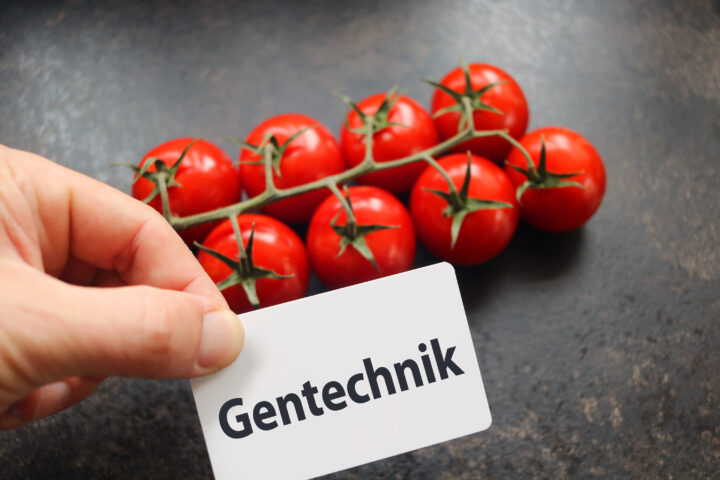
Clearing house for patent rights: Not in the interests of inventors and food security
On 22 May 2024, the Federal Council submitted a draft revision of patent law for consultation. A new clearing centre is planned to improve the transparency of patents in the field of plant breeding. While transparency is fundamentally positive, the chosen approach is problematic. Instead of the beneficiaries, it imposes new obligations on innovators and means that Switzerland is going it alone. This is a bad signal for innovative companies.
Tuesday, June 11, 2024
There is agreement on one issue: new plant varieties harbour enormous opportunities for agriculture. The legal framework for plant breeding is therefore also an item on the political agenda. The primary issue here is the regulation of new breeding methods. In principle, both the EU and Switzerland want to authorise new breeding technologies such as gene scissors in the future. The aim is for agriculture to be better able to withstand both pests and climate change with new varieties.
Against new technologies and patents
Patents are part of the broader debate on breeding. In May, the Federal Council submitted a draft revision of patent law for consultation. The consultation runs until 12 September. Under the title «A good approach», the BauernZeitung reports on the new reporting system for more transparency in the area of plant breeding patents. The title is based on a quote from François Meienberg of Pro Specie Rara. The organisation openly opposes new breeding technologies in the Swiss GMO-free Alliance. The statement by the lobbyist, who was already the figurehead of the ‘No patents on seeds’ campaign in his previous role at Public Eye, should therefore be taken with a grain of salt. In fact, the proposed regulation is highly problematic.
Burdens and risks for the innovators instead of the beneficiaries
The legal initiative is based on a motion by the Science Committee of the Council of States. It is based on the demand for increased transparency in plant breeding. According to the representative of Pro Specie Rara, breeders who rely on conventional methods should not have to realise after «ten years of breeding work’ that a new variety is the intellectual property of a company due to an already patented trait. This is understandable, but the authorities» proposal goes far too far. A clearing centre is to be set up at the Swiss Federal Institute of Intellectual Property (IPI). Breeders could report there which plants they are working with. Patent holders would then have to actively draw their attention to any patents. And if they fail to do so, they forfeit their right to enforce their patents against the breeder after 90 days.
Effect like a reversal of the burden of proof for innovative companies
The proposed regulation is highly problematic for the following reasons. It is tantamount to a ‘reversal of the burden of proof’. The patent holder would have to actively defend his right on an ongoing basis. This represents a major effort, especially if he does not even know the varieties used (e.g. by a competitor company). In plant breeding, many SMEs have the opportunity to patent plant characteristics with innovative developments, particularly with the new breeding methods. The new bureaucracy with the obligation to constantly defend innovations is a major burden, especially for research-based start-ups.
Switzerland going it alone creates barriers to trade
If the bill goes through, Switzerland will stand alone. No other country in the world has such a regulation in the field of plant biotechnology. The proposal creates new barriers to trade. When importing and exporting reproducible plant material, the question suddenly arises: do different property rights apply on the other side of the border? The new rule for patents in Switzerland would not change EU law - all patents would continue to apply abroad regardless of local directives. It is also an illusion that foreign companies will be able to monitor the new Swiss clearing platform on an ongoing basis. The authorities will find it difficult to reach companies in distant foreign countries. This would make Switzerland even less attractive in the area of private-sector research on plants due to the special rule for patents. In addition, the regulation is not compatible with important trade agreements. A lively start-up and SME landscape in the field of modern plant genetics will thus hardly be able to develop in Switzerland. There is a threat of exclusion from important innovations in plant breeding - in an area in which Switzerland is highly networked with other countries and self-sufficiency is also an illusion from a financial perspective.
Public register as a targeted solution
Instead of creating a new bureaucracy, there are simpler solutions: For example, a binding public register in which variety owners enter all patents on their plant varieties commercialised in Switzerland. This would avoid both the problem of the «reversal of the burden of proof» and the massive expense of permanently monitoring the proposed clearing centre. Once carefully and cleanly registered – which the authorities would be happy to check – the patents for each variety can be viewed and disclosed by everyone.
Transparency is important for innovation – just like the protection of inventors. Patents per se are nothing more than the disclosure of the «recipe» of the invention so that others can use it in return for a licence fee. Transparency is therefore also in the interests of the industry. The industry has already created several platforms at European level, which are also open to Swiss breeders, in order to increase transparency in the field of plant breeding:
The European database «Patent Information and Transparency Online» (PINTO) from Euroseeds creates transparency by linking variety names and patents on methods or plant properties. It can be accessed by anyone and is free of charge.
In the area of patent protection specifically for arable crops, the digital licensing platform ‘Agricultural Crop Licensing Platform’ (ACLP) makes patents easy to find and inventions accessible even for small breeders. With just a few clicks, a company can request a licence via the platform under «fair» (FRAND) conditions and then use the technology for its own breeding.
In the vegetable seed sector, family and large companies have jointly created the «International Licensing Platform Vegetable» (ILP-Vegetable) with the same aim.
This simplified access to licences makes it possible to «boost» innovation and build on the technologies of others while ensuring their return on investment via licence fees. This is what our society depends on.
Such solutions are close to the market. Something similar could also be introduced on a mandatory basis by the state. However, the federal government would like to take a different path, with the risk of penalising innovation. But this is literally not in the spirit of the inventor. In view of the disadvantages of the proposed reporting system, the headline in the BauernZeitung on the Federal Council's proposal should read: «A highly problematic solution.»
No flood of patents to be expected
Sources
Bauernzeitung: Published in the print edition on 1 June 2024 under the title ‘Ein guter Ansatz’. Also available online since 4 June 2024
Kindly note:
We, a non-native editorial team value clear and faultless communication. At times we have to prioritize speed over perfection, utilizing tools, that are still learning.
We are deepL sorry for any observed stylistic or spelling errors.
Related articles

Residue is not the same as residue
Painkillers like Voltaren are a blessing for us – yet in our rivers they can harm fish. If these were crop protection products, calls for bans would be immediate. It becomes clear that we are applying double standards.

ARTE documentary: Genetic engineering in organic farming?
The ARTE documentary “Genetic engineering in organic farming?” examines key controversial questions of modern agriculture: Is the general exclusion of new breeding technologies still up to date? Can the resistance of organic farming be justified scientifically?

The Great Suffering of Farmers
Fire blight, Japanese beetles, or grapevine yellows – farmers in Valais, too, are increasingly feeling helpless in the face of the threats posed by nature. More and more often, they lack the means to effectively protect their crops. This makes it all the more important for the Federal Council to place a pragmatic balancing of interests at the forefront when setting threshold values.

'Tomatoes on your eyes'
The submitted “Food Protection Initiative” calls for “GMO-free food.” Leaving aside this illusory demand, its adoption would mean more bureaucracy, more trade barriers, and less innovation. The Swiss Farmers’ Union describes the proposal as “unnecessary” and warns of a setback to the goal of achieving an even more sustainable agriculture.

